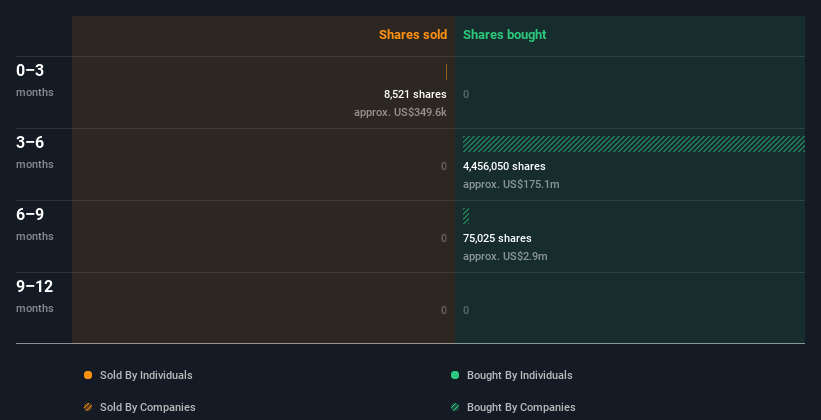
Some CNA Financial Corporation (NYSE:CNA) shareholders may be a little concerned to see that the Executive VP & Global Head of Underwriting, Douglas Worman, recently sold a substantial US$1.1m worth of stock at a price of US$40.08 per share. That's a big disposal, and it decreased their holding size by 20%, which is notable but not too bad.
See our latest analysis for CNA Financial
CNA Financial Insider Transactions Over The Last Year
In fact, the recent sale by Douglas Worman was the biggest sale of CNA Financial shares made by an insider individual in the last twelve months, according to our records. That means that an insider was selling shares at below the current price (US$40.66). When an insider sells below the current price, it suggests that they considered that lower price to be fair. That makes us wonder what they think of the (higher) recent valuation. While insider selling is not a positive sign, we can't be sure if it does mean insiders think the shares are fully valued, so it's only a weak sign. We note that the biggest single sale was only 20%of Douglas Worman's holding.
In the last year CNA Financial insiders didn't buy any company stock. You can see the insider transactions (by companies and individuals) over the last year depicted in the chart below. If you click on the chart, you can see all the individual transactions, including the share price, individual, and the date!

I will like CNA Financial better if I see some big insider buys. While we wait, check out this free list of growing companies with considerable, recent, insider buying.
Does CNA Financial Boast High Insider Ownership?
Many investors like to check how much of a company is owned by insiders. We usually like to see fairly high levels of insider ownership. Insiders own 0.6% of CNA Financial shares, worth about US$63m. This level of insider ownership is good but just short of being particularly stand-out. It certainly does suggest a reasonable degree of alignment.
So What Do The CNA Financial Insider Transactions Indicate?
Insiders sold stock recently, but they haven't been buying. Looking to the last twelve months, our data doesn't show any insider buying. On the plus side, CNA Financial makes money, and is growing profits. Insiders own shares, but we're still pretty cautious, given the history of sales. We're in no rush to buy! So while it's helpful to know what insiders are doing in terms of buying or selling, it's also helpful to know the risks that a particular company is facing. Every company has risks, and we've spotted 1 warning sign for CNA Financial you should know about.
Of course, you might find a fantastic investment by looking elsewhere. So take a peek at this free list of interesting companies.
For the purposes of this article, insiders are those individuals who report their transactions to the relevant regulatory body. We currently account for open market transactions and private dispositions of direct interests only, but not derivative transactions or indirect interests.
If you're looking to trade CNA Financial, open an account with the lowest-cost platform trusted by professionals, Interactive Brokers.
With clients in over 200 countries and territories, and access to 160 markets, IBKR lets you trade stocks, options, futures, forex, bonds and funds from a single integrated account.
Enjoy no hidden fees, no account minimums, and FX conversion rates as low as 0.03%, far better than what most brokers offer.
Sponsored ContentNew: AI Stock Screener & Alerts
Our new AI Stock Screener scans the market every day to uncover opportunities.
• Dividend Powerhouses (3%+ Yield)
• Undervalued Small Caps with Insider Buying
• High growth Tech and AI Companies
Or build your own from over 50 metrics.
Have feedback on this article? Concerned about the content? Get in touch with us directly. Alternatively, email editorial-team (at) simplywallst.com.
This article by Simply Wall St is general in nature. We provide commentary based on historical data and analyst forecasts only using an unbiased methodology and our articles are not intended to be financial advice. It does not constitute a recommendation to buy or sell any stock, and does not take account of your objectives, or your financial situation. We aim to bring you long-term focused analysis driven by fundamental data. Note that our analysis may not factor in the latest price-sensitive company announcements or qualitative material. Simply Wall St has no position in any stocks mentioned.
About NYSE:CNA
CNA Financial
An insurance holding company, primarily provides commercial property and casualty insurance products in the United States and internationally.
Established dividend payer and good value.
Similar Companies
Market Insights
Community Narratives




